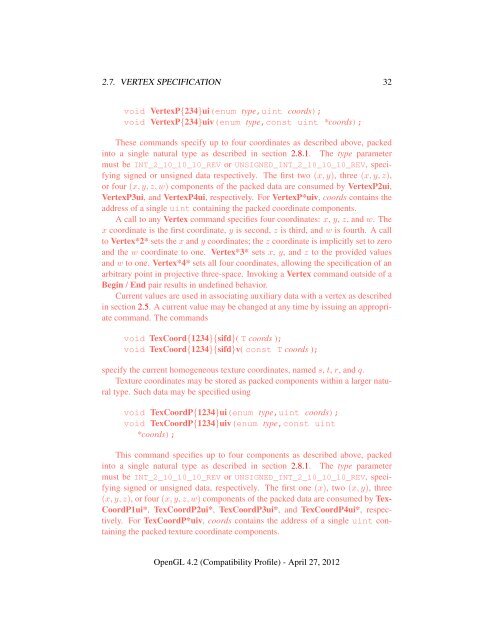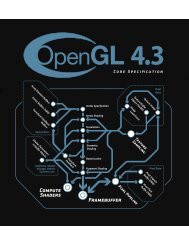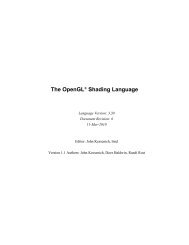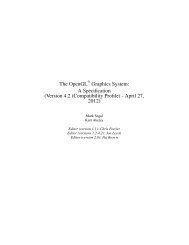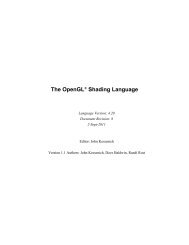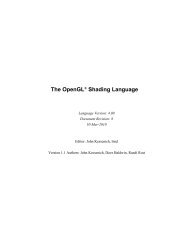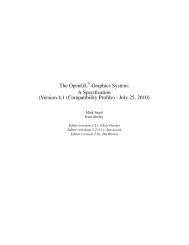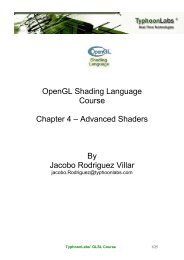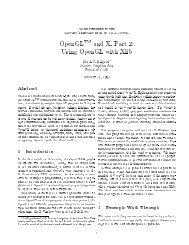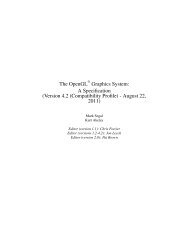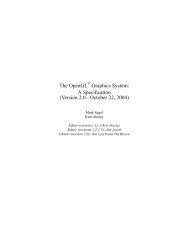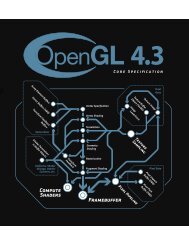- Page 1 and 2: The OpenGL R○ Graphics System: A
- Page 3 and 4: Contents 1 Introduction 1 1.1 Forma
- Page 5 and 6: CONTENTS iii 2.14.14 Required State
- Page 7 and 8: CONTENTS v 3.11 Color Sum . . . . .
- Page 9 and 10: CONTENTS vii A Invariance 588 A.1 R
- Page 11 and 12: CONTENTS ix L Version 4.2 659 L.1 N
- Page 13 and 14: CONTENTS xi M.3.70 BPTC texture com
- Page 15 and 16: LIST OF FIGURES xiii 3.11 Example o
- Page 17 and 18: LIST OF TABLES xv 3.10 UNSIGNED_SHO
- Page 19 and 20: LIST OF TABLES xvii 6.29 Pixel Oper
- Page 21 and 22: Chapter 1 Introduction This documen
- Page 23 and 24: 1.5. OUR VIEW 3 the CPU and the gra
- Page 25 and 26: Chapter 2 OpenGL Operation 2.1 Open
- Page 27 and 28: 2.1. OPENGL FUNDAMENTALS 7 section
- Page 29 and 30: 2.1. OPENGL FUNDAMENTALS 9 must not
- Page 31 and 32: 2.1. OPENGL FUNDAMENTALS 11 2.1.2 F
- Page 33 and 34: 2.3. GL COMMAND SYNTAX 13 describe
- Page 35 and 36: 2.3. GL COMMAND SYNTAX 15 indicates
- Page 37 and 38: 2.4. BASIC GL OPERATION 17 Transfor
- Page 39 and 40: 2.6. BEGIN/END PARADIGM 19 To allow
- Page 41 and 42: 2.6. BEGIN/END PARADIGM 21 Vertex C
- Page 43 and 44: 2.6. BEGIN/END PARADIGM 23 2.6.1 Be
- Page 45 and 46: 2.6. BEGIN/END PARADIGM 25 vertex A
- Page 47 and 48: 2.6. BEGIN/END PARADIGM 27 Figure 2
- Page 49 and 50: 2.6. BEGIN/END PARADIGM 29 Primitiv
- Page 51: 2.7. VERTEX SPECIFICATION 31 that i
- Page 55 and 56: 2.7. VERTEX SPECIFICATION 35 The Co
- Page 57 and 58: 2.7. VERTEX SPECIFICATION 37 When v
- Page 59 and 60: 2.8. VERTEX ARRAYS 39 indicates the
- Page 61 and 62: 2.8. VERTEX ARRAYS 41 integer value
- Page 63 and 64: 2.8. VERTEX ARRAYS 43 does not exis
- Page 65 and 66: 2.8. VERTEX ARRAYS 45 and void Enab
- Page 67 and 68: 2.8. VERTEX ARRAYS 47 array is enab
- Page 69 and 70: 2.8. VERTEX ARRAYS 49 if (mode or p
- Page 71 and 72: 2.8. VERTEX ARRAYS 51 The command v
- Page 73 and 74: 2.8. VERTEX ARRAYS 53 if (no elemen
- Page 75 and 76: 2.8. VERTEX ARRAYS 55 format e t e
- Page 77 and 78: 2.9. BUFFER OBJECTS 57 Target name
- Page 79 and 80: 2.9. BUFFER OBJECTS 59 Each target
- Page 81 and 82: 2.9. BUFFER OBJECTS 61 Name Value B
- Page 83 and 84: 2.9. BUFFER OBJECTS 63 Name Value B
- Page 85 and 86: 2.9. BUFFER OBJECTS 65 FlushMappedB
- Page 87 and 88: 2.9. BUFFER OBJECTS 67 that GL impl
- Page 89 and 90: 2.10. VERTEX ARRAY OBJECTS 69 2.10
- Page 91 and 92: 2.12. FIXED-FUNCTION VERTEX TRANSFO
- Page 93 and 94: 2.12. FIXED-FUNCTION VERTEX TRANSFO
- Page 95 and 96: 2.12. FIXED-FUNCTION VERTEX TRANSFO
- Page 97 and 98: 2.12. FIXED-FUNCTION VERTEX TRANSFO
- Page 99 and 100: 2.12. FIXED-FUNCTION VERTEX TRANSFO
- Page 101 and 102: 2.13. FIXED-FUNCTION VERTEX LIGHTIN
- Page 103 and 104:
2.13. FIXED-FUNCTION VERTEX LIGHTIN
- Page 105 and 106:
2.13. FIXED-FUNCTION VERTEX LIGHTIN
- Page 107 and 108:
2.13. FIXED-FUNCTION VERTEX LIGHTIN
- Page 109 and 110:
2.13. FIXED-FUNCTION VERTEX LIGHTIN
- Page 111 and 112:
2.13. FIXED-FUNCTION VERTEX LIGHTIN
- Page 113 and 114:
2.14. VERTEX SHADERS 93 shader, its
- Page 115 and 116:
2.14. VERTEX SHADERS 95 If shader i
- Page 117 and 118:
2.14. VERTEX SHADERS 97 • One or
- Page 119 and 120:
2.14. VERTEX SHADERS 99 any stage.
- Page 121 and 122:
2.14. VERTEX SHADERS 101 2.14.4 Pro
- Page 123 and 124:
2.14. VERTEX SHADERS 103 been previ
- Page 125 and 126:
2.14. VERTEX SHADERS 105 • For ea
- Page 127 and 128:
2.14. VERTEX SHADERS 107 • Six un
- Page 129 and 130:
2.14. VERTEX SHADERS 109 gram execu
- Page 131 and 132:
2.14. VERTEX SHADERS 111 values are
- Page 133 and 134:
2.14. VERTEX SHADERS 113 Built-in a
- Page 135 and 136:
2.14. VERTEX SHADERS 115 When a pro
- Page 137 and 138:
2.14. VERTEX SHADERS 117 void GetAc
- Page 139 and 140:
2.14. VERTEX SHADERS 119 bufferInde
- Page 141 and 142:
2.14. VERTEX SHADERS 121 program is
- Page 143 and 144:
2.14. VERTEX SHADERS 123 OpenGL Sha
- Page 145 and 146:
2.14. VERTEX SHADERS 125 OpenGL Sha
- Page 147 and 148:
2.14. VERTEX SHADERS 127 ments in t
- Page 149 and 150:
2.14. VERTEX SHADERS 129 The Unifor
- Page 151 and 152:
2.14. VERTEX SHADERS 131 void Progr
- Page 153 and 154:
2.14. VERTEX SHADERS 133 • Arrays
- Page 155 and 156:
2.14. VERTEX SHADERS 135 with targe
- Page 157 and 158:
2.14. VERTEX SHADERS 137 Each of a
- Page 159 and 160:
2.14. VERTEX SHADERS 139 is returne
- Page 161 and 162:
2.14. VERTEX SHADERS 141 2.14.10 Im
- Page 163 and 164:
2.14. VERTEX SHADERS 143 void Trans
- Page 165 and 166:
2.14. VERTEX SHADERS 145 INVALID_OP
- Page 167 and 168:
2.14. VERTEX SHADERS 147 The follow
- Page 169 and 170:
2.14. VERTEX SHADERS 149 Texture Si
- Page 171 and 172:
2.14. VERTEX SHADERS 151 dent const
- Page 173 and 174:
2.14. VERTEX SHADERS 153 as describ
- Page 175 and 176:
2.14. VERTEX SHADERS 155 Separable
- Page 177 and 178:
2.14. VERTEX SHADERS 157 invocation
- Page 179 and 180:
2.14. VERTEX SHADERS 159 • COMMAN
- Page 181 and 182:
2.14. VERTEX SHADERS 161 • Data w
- Page 183 and 184:
2.15. TESSELLATION 163 2.15 Tessell
- Page 185 and 186:
2.15. TESSELLATION 165 Tessellation
- Page 187 and 188:
2.15. TESSELLATION 167 Similarly to
- Page 189 and 190:
2.15. TESSELLATION 169 nent count.
- Page 191 and 192:
2.15. TESSELLATION 171 Figure 2.13.
- Page 193 and 194:
2.15. TESSELLATION 173 along each t
- Page 195 and 196:
2.15. TESSELLATION 175 ermost inner
- Page 197 and 198:
2.15. TESSELLATION 177 Figure 2.15.
- Page 199 and 200:
2.15. TESSELLATION 179 Figure 2.16.
- Page 201 and 202:
2.15. TESSELLATION 181 variables th
- Page 203 and 204:
2.15. TESSELLATION 183 Additionally
- Page 205 and 206:
2.16. GEOMETRY SHADERS 185 executed
- Page 207 and 208:
2.16. GEOMETRY SHADERS 187 forms an
- Page 209 and 210:
2.16. GEOMETRY SHADERS 189 subseque
- Page 211 and 212:
2.16. GEOMETRY SHADERS 191 The Open
- Page 213 and 214:
2.16. GEOMETRY SHADERS 193 rays. Th
- Page 215 and 216:
2.17. COORDINATE TRANSFORMATIONS 19
- Page 217 and 218:
2.18. ASYNCHRONOUS QUERIES 197 The
- Page 219 and 220:
2.18. ASYNCHRONOUS QUERIES 199 the
- Page 221 and 222:
2.20. TRANSFORM FEEDBACK 201 the GL
- Page 223 and 224:
2.20. TRANSFORM FEEDBACK 203 object
- Page 225 and 226:
2.20. TRANSFORM FEEDBACK 205 the ge
- Page 227 and 228:
2.20. TRANSFORM FEEDBACK 207 and th
- Page 229 and 230:
2.22. FLATSHADING 209 stream index
- Page 231 and 232:
2.23. PRIMITIVE CLIPPING 211 void S
- Page 233 and 234:
2.23. PRIMITIVE CLIPPING 213 If the
- Page 235 and 236:
2.25. CURRENT RASTER POSITION 215 I
- Page 237 and 238:
2.25. CURRENT RASTER POSITION 217 R
- Page 239 and 240:
Chapter 3 Rasterization Rasterizati
- Page 241 and 242:
3.1. DISCARDING PRIMITIVES BEFORE R
- Page 243 and 244:
3.3. ANTIALIASING 223 3. The sum of
- Page 245 and 246:
3.4. POINTS 225 any other variables
- Page 247 and 248:
3.4. POINTS 227 and the fade factor
- Page 249 and 250:
¡ ¡ ¡ ¡ ¡ ¡ 3.4. POINTS 229 5
- Page 251 and 252:
3.4. POINTS 231 All fragments produ
- Page 253 and 254:
3.5. LINE SEGMENTS 233 3.5 Line Seg
- Page 255 and 256:
3.5. LINE SEGMENTS 235 top or both
- Page 257 and 258:
3.5. LINE SEGMENTS 237 width = 2 wi
- Page 259 and 260:
3.6. POLYGONS 239 In addition, duri
- Page 261 and 262:
3.6. POLYGONS 241 such a case we re
- Page 263 and 264:
3.6. POLYGONS 243 3.6.3 Antialiasin
- Page 265 and 266:
3.6. POLYGONS 245 The offset value
- Page 267 and 268:
3.7. PIXEL RECTANGLES 247 Parameter
- Page 269 and 270:
3.7. PIXEL RECTANGLES 249 Parameter
- Page 271 and 272:
3.7. PIXEL RECTANGLES 251 Table Nam
- Page 273 and 274:
3.7. PIXEL RECTANGLES 253 width are
- Page 275 and 276:
3.7. PIXEL RECTANGLES 255 The red,
- Page 277 and 278:
3.7. PIXEL RECTANGLES 257 meanings,
- Page 279 and 280:
3.7. PIXEL RECTANGLES 259 the flag.
- Page 281 and 282:
3.7. PIXEL RECTANGLES 261 width and
- Page 283 and 284:
3.7. PIXEL RECTANGLES 263 Format Na
- Page 285 and 286:
3.7. PIXEL RECTANGLES 265 ROW_LENGT
- Page 287 and 288:
3.7. PIXEL RECTANGLES 267 UNSIGNED_
- Page 289 and 290:
3.7. PIXEL RECTANGLES 269 UNSIGNED_
- Page 291 and 292:
3.7. PIXEL RECTANGLES 271 Format Fi
- Page 293 and 294:
3.7. PIXEL RECTANGLES 273 void Draw
- Page 295 and 296:
3.7. PIXEL RECTANGLES 275 A fragmen
- Page 297 and 298:
3.7. PIXEL RECTANGLES 277 Base Inte
- Page 299 and 300:
3.7. PIXEL RECTANGLES 279 Base Filt
- Page 301 and 302:
3.7. PIXEL RECTANGLES 281 and C c i
- Page 303 and 304:
3.7. PIXEL RECTANGLES 283 ALPHA_BIA
- Page 305 and 306:
3.8. BITMAPS 285 ignored.) If a par
- Page 307 and 308:
3.9. EARLY PER-FRAGMENT TESTS 287 B
- Page 309 and 310:
3.10. TEXTURING 289 cube map array
- Page 311 and 312:
3.10. TEXTURING 291 returns n previ
- Page 313 and 314:
3.10. TEXTURING 293 3.10.2 Sampler
- Page 315 and 316:
3.10. TEXTURING 295 An INVALID_ENUM
- Page 317 and 318:
3.10. TEXTURING 297 Base Internal F
- Page 319 and 320:
3.10. TEXTURING 299 RGB10_A2UI, RGB
- Page 321 and 322:
3.10. TEXTURING 301 Sized internal
- Page 323 and 324:
3.10. TEXTURING 303 Sized Base A L
- Page 325 and 326:
3.10. TEXTURING 305 Compressed Inte
- Page 327 and 328:
3.10. TEXTURING 307 for image array
- Page 329 and 330:
3.10. TEXTURING 309 When target is
- Page 331 and 332:
3.10. TEXTURING 311 3.10.4 Alternat
- Page 333 and 334:
3.10. TEXTURING 313 The target argu
- Page 335 and 336:
3.10. TEXTURING 315 Counting from z
- Page 337 and 338:
3.10. TEXTURING 317 define one-, tw
- Page 339 and 340:
3.10. TEXTURING 319 • a, the valu
- Page 341 and 342:
3.10. TEXTURING 321 If the target p
- Page 343 and 344:
3.10. TEXTURING 323 void TexImage2D
- Page 345 and 346:
3.10. TEXTURING 325 When a buffer t
- Page 347 and 348:
3.10. TEXTURING 327 void TexParamet
- Page 349 and 350:
3.10. TEXTURING 329 Texture paramet
- Page 351 and 352:
3.10. TEXTURING 331 When seamless c
- Page 353 and 354:
3.10. TEXTURING 333 for a two-dimen
- Page 355 and 356:
3.10. TEXTURING 335 and the value r
- Page 357 and 358:
3.10. TEXTURING 337 where τ ij is
- Page 359 and 360:
3.10. TEXTURING 339 -or- The value
- Page 361 and 362:
3.10. TEXTURING 341 The rules for N
- Page 363 and 364:
3.10. TEXTURING 343 definition of c
- Page 365 and 366:
3.10. TEXTURING 345 height (two- an
- Page 367 and 368:
3.10. TEXTURING 347 There is no ima
- Page 369 and 370:
3.10. TEXTURING 349 for (i = 0; i <
- Page 371 and 372:
3.10. TEXTURING 351 3.10.17 Texture
- Page 373 and 374:
3.10. TEXTURING 353 Texture Base Te
- Page 375 and 376:
3.10. TEXTURING 355 COMBINE_RGB Tex
- Page 377 and 378:
3.10. TEXTURING 357 is 0.0. 3.10.18
- Page 379 and 380:
3.10. TEXTURING 359 ferior to conve
- Page 381 and 382:
3.10. TEXTURING 361 C f CT 0 CT 1 T
- Page 383 and 384:
3.10. TEXTURING 363 ⌊ ⌋ layeror
- Page 385 and 386:
3.10. TEXTURING 365 • the type of
- Page 387 and 388:
3.10. TEXTURING 367 Supported image
- Page 389 and 390:
3.11. COLOR SUM 369 Texel sizes, co
- Page 391 and 392:
3.13. FRAGMENT SHADERS 371 f is use
- Page 393 and 394:
3.13. FRAGMENT SHADERS 373 The Open
- Page 395 and 396:
3.13. FRAGMENT SHADERS 375 • The
- Page 397 and 398:
3.13. FRAGMENT SHADERS 377 is defin
- Page 399 and 400:
3.13. FRAGMENT SHADERS 379 per-frag
- Page 401 and 402:
3.14. ANTIALIASING APPLICATION 381
- Page 403 and 404:
Chapter 4 Per-Fragment Operations a
- Page 405 and 406:
4.1. PER-FRAGMENT OPERATIONS 385 Fr
- Page 407 and 408:
4.1. PER-FRAGMENT OPERATIONS 387 st
- Page 409 and 410:
4.1. PER-FRAGMENT OPERATIONS 389 pr
- Page 411 and 412:
4.1. PER-FRAGMENT OPERATIONS 391 po
- Page 413 and 414:
4.1. PER-FRAGMENT OPERATIONS 393 4.
- Page 415 and 416:
4.1. PER-FRAGMENT OPERATIONS 395 th
- Page 417 and 418:
4.1. PER-FRAGMENT OPERATIONS 397 or
- Page 419 and 420:
4.1. PER-FRAGMENT OPERATIONS 399 Ge
- Page 421 and 422:
4.1. PER-FRAGMENT OPERATIONS 401 4.
- Page 423 and 424:
4.1. PER-FRAGMENT OPERATIONS 403 ab
- Page 425 and 426:
4.2. WHOLE FRAMEBUFFER OPERATIONS 4
- Page 427 and 428:
4.2. WHOLE FRAMEBUFFER OPERATIONS 4
- Page 429 and 430:
4.2. WHOLE FRAMEBUFFER OPERATIONS 4
- Page 431 and 432:
4.2. WHOLE FRAMEBUFFER OPERATIONS 4
- Page 433 and 434:
4.2. WHOLE FRAMEBUFFER OPERATIONS 4
- Page 435 and 436:
4.3. DRAWING, READING, AND COPYING
- Page 437 and 438:
4.3. DRAWING, READING, AND COPYING
- Page 439 and 440:
4.3. DRAWING, READING, AND COPYING
- Page 441 and 442:
4.3. DRAWING, READING, AND COPYING
- Page 443 and 444:
4.3. DRAWING, READING, AND COPYING
- Page 445 and 446:
4.3. DRAWING, READING, AND COPYING
- Page 447 and 448:
4.3. DRAWING, READING, AND COPYING
- Page 449 and 450:
4.4. FRAMEBUFFER OBJECTS 429 4.4.1
- Page 451 and 452:
4.4. FRAMEBUFFER OBJECTS 431 • If
- Page 453 and 454:
4.4. FRAMEBUFFER OBJECTS 433 with t
- Page 455 and 456:
4.4. FRAMEBUFFER OBJECTS 435 Sized
- Page 457 and 458:
4.4. FRAMEBUFFER OBJECTS 437 Attach
- Page 459 and 460:
4.4. FRAMEBUFFER OBJECTS 439 operat
- Page 461 and 462:
4.4. FRAMEBUFFER OBJECTS 441 Render
- Page 463 and 464:
4.4. FRAMEBUFFER OBJECTS 443 4.4.4
- Page 465 and 466:
4.4. FRAMEBUFFER OBJECTS 445 • Th
- Page 467 and 468:
4.4. FRAMEBUFFER OBJECTS 447 Otherw
- Page 469 and 470:
4.4. FRAMEBUFFER OBJECTS 449 corres
- Page 471 and 472:
4.4. FRAMEBUFFER OBJECTS 451 When c
- Page 473 and 474:
5.1. EVALUATORS 453 target k Values
- Page 475 and 476:
5.1. EVALUATORS 455 void EvalCoord{
- Page 477 and 478:
5.1. EVALUATORS 457 for i = q 1 to
- Page 479 and 480:
5.2. SELECTION 459 LoadName replace
- Page 481 and 482:
5.3. FEEDBACK 461 buffer is a point
- Page 483 and 484:
5.4. TIMER QUERIES 463 feedback-lis
- Page 485 and 486:
5.5. DISPLAY LISTS 465 pointers whi
- Page 487 and 488:
5.5. DISPLAY LISTS 467 the effect o
- Page 489 and 490:
5.6. FLUSH AND FINISH 469 setting;
- Page 491 and 492:
5.7. SYNC OBJECTS AND FENCES 471 vo
- Page 493 and 494:
5.8. HINTS 473 See appendix D.2 for
- Page 495 and 496:
Chapter 6 State and State Requests
- Page 497 and 498:
6.1. QUERYING GL STATE 477 that mas
- Page 499 and 500:
6.1. QUERYING GL STATE 479 data is
- Page 501 and 502:
6.1. QUERYING GL STATE 481 turned s
- Page 503 and 504:
6.1. QUERYING GL STATE 483 Base Int
- Page 505 and 506:
6.1. QUERYING GL STATE 485 INVALID_
- Page 507 and 508:
6.1. QUERYING GL STATE 487 type Nam
- Page 509 and 510:
6.1. QUERYING GL STATE 489 If reset
- Page 511 and 512:
6.1. QUERYING GL STATE 491 Value CO
- Page 513 and 514:
6.1. QUERYING GL STATE 493 For occl
- Page 515 and 516:
6.1. QUERYING GL STATE 495 returns
- Page 517 and 518:
6.1. QUERYING GL STATE 497 COUNTER_
- Page 519 and 520:
6.1. QUERYING GL STATE 499 If pname
- Page 521 and 522:
6.1. QUERYING GL STATE 501 returns
- Page 523 and 524:
6.1. QUERYING GL STATE 503 of this
- Page 525 and 526:
6.1. QUERYING GL STATE 505 void Get
- Page 527 and 528:
6.1. QUERYING GL STATE 507 generate
- Page 529 and 530:
6.1. QUERYING GL STATE 509 returns
- Page 531 and 532:
6.1. QUERYING GL STATE 511 take a b
- Page 533 and 534:
6.2. STATE TABLES 513 state variabl
- Page 535 and 536:
6.2. STATE TABLES 515 OLD NEW Get v
- Page 537 and 538:
6.2. STATE TABLES 517 Get value Typ
- Page 539 and 540:
6.2. STATE TABLES 519 Get value Typ
- Page 541 and 542:
6.2. STATE TABLES 521 Get value Typ
- Page 543 and 544:
6.2. STATE TABLES 523 Get value Typ
- Page 545 and 546:
6.2. STATE TABLES 525 Get Command I
- Page 547 and 548:
6.2. STATE TABLES 527 Get value Typ
- Page 549 and 550:
6.2. STATE TABLES 529 Get value Typ
- Page 551 and 552:
6.2. STATE TABLES 531 Get value Typ
- Page 553 and 554:
6.2. STATE TABLES 533 Get value Typ
- Page 555 and 556:
6.2. STATE TABLES 535 Get value Typ
- Page 557 and 558:
6.2. STATE TABLES 537 Get value Typ
- Page 559 and 560:
6.2. STATE TABLES 539 Get value Typ
- Page 561 and 562:
6.2. STATE TABLES 541 Get value Typ
- Page 563 and 564:
6.2. STATE TABLES 543 Get value Typ
- Page 565 and 566:
6.2. STATE TABLES 545 Get value Typ
- Page 567 and 568:
6.2. STATE TABLES 547 Get Command I
- Page 569 and 570:
6.2. STATE TABLES 549 Get value Typ
- Page 571 and 572:
6.2. STATE TABLES 551 Get value Typ
- Page 573 and 574:
6.2. STATE TABLES 553 Get value Typ
- Page 575 and 576:
6.2. STATE TABLES 555 Get value Typ
- Page 577 and 578:
6.2. STATE TABLES 557 Get value Typ
- Page 579 and 580:
6.2. STATE TABLES 559 Get value Typ
- Page 581 and 582:
6.2. STATE TABLES 561 Get value Typ
- Page 583 and 584:
6.2. STATE TABLES 563 Get value Typ
- Page 585 and 586:
6.2. STATE TABLES 565 Get value Typ
- Page 587 and 588:
6.2. STATE TABLES 567 Get value Typ
- Page 589 and 590:
6.2. STATE TABLES 569 Get value Typ
- Page 591 and 592:
6.2. STATE TABLES 571 Get value Typ
- Page 593 and 594:
6.2. STATE TABLES 573 Get Command M
- Page 595 and 596:
6.2. STATE TABLES 575 Get value Typ
- Page 597 and 598:
6.2. STATE TABLES 577 Get value Typ
- Page 599 and 600:
6.2. STATE TABLES 579 Get value Typ
- Page 601 and 602:
6.2. STATE TABLES 581 Get value Typ
- Page 603 and 604:
6.2. STATE TABLES 583 Get value Typ
- Page 605 and 606:
6.2. STATE TABLES 585 Get value Typ
- Page 607 and 608:
6.2. STATE TABLES 587 Get value Typ
- Page 609 and 610:
A.2. MULTI-PASS ALGORITHMS 589 A.2
- Page 611 and 612:
A.3. INVARIANCE RULES 591 Rule 3 Th
- Page 613 and 614:
A.4. TESSELLATION INVARIANCE 593 if
- Page 615 and 616:
A.6. WHAT ALL THIS MEANS 595 Becaus
- Page 617 and 618:
597 stencil comparison function; it
- Page 619 and 620:
Appendix C Compressed Texture Image
- Page 621 and 622:
C.1. RGTC COMPRESSED TEXTURE IMAGE
- Page 623 and 624:
C.2. BPTC COMPRESSED TEXTURE IMAGE
- Page 625 and 626:
C.2. BPTC COMPRESSED TEXTURE IMAGE
- Page 627 and 628:
C.2. BPTC COMPRESSED TEXTURE IMAGE
- Page 629 and 630:
C.2. BPTC COMPRESSED TEXTURE IMAGE
- Page 631 and 632:
C.2. BPTC COMPRESSED TEXTURE IMAGE
- Page 633 and 634:
C.2. BPTC COMPRESSED TEXTURE IMAGE
- Page 635 and 636:
D.1. OBJECT DELETION BEHAVIOR 615 m
- Page 637 and 638:
D.3. PROPAGATING CHANGES TO OBJECTS
- Page 639 and 640:
D.3. PROPAGATING CHANGES TO OBJECTS
- Page 641 and 642:
E.1. CORE AND COMPATIBILITY PROFILE
- Page 643 and 644:
E.2. DEPRECATED AND REMOVED FEATURE
- Page 645 and 646:
E.2. DEPRECATED AND REMOVED FEATURE
- Page 647 and 648:
Appendix F Version 3.0 and Before O
- Page 649 and 650:
F.3. CHANGED TOKENS 629 New Token N
- Page 651 and 652:
F.5. CREDITS AND ACKNOWLEDGEMENTS 6
- Page 653 and 654:
F.5. CREDITS AND ACKNOWLEDGEMENTS 6
- Page 655 and 656:
G.2. DEPRECATION MODEL 635 state ha
- Page 657 and 658:
G.4. CREDITS AND ACKNOWLEDGEMENTS 6
- Page 659 and 660:
Appendix H Version 3.2 OpenGL versi
- Page 661 and 662:
H.4. CHANGE LOG 641 New Token Name
- Page 663 and 664:
H.5. CREDITS AND ACKNOWLEDGEMENTS 6
- Page 665 and 666:
H.5. CREDITS AND ACKNOWLEDGEMENTS 6
- Page 667 and 668:
I.2. DEPRECATION MODEL 647 ing fact
- Page 669 and 670:
I.4. CREDITS AND ACKNOWLEDGEMENTS 6
- Page 671 and 672:
J.1. NEW FEATURES 651 • Mechanism
- Page 673 and 674:
J.4. CREDITS AND ACKNOWLEDGEMENTS 6
- Page 675 and 676:
Appendix K Version 4.1 OpenGL versi
- Page 677 and 678:
K.5. CREDITS AND ACKNOWLEDGEMENTS 6
- Page 679 and 680:
Appendix L Version 4.2 OpenGL versi
- Page 681 and 682:
L.4. CHANGE LOG 661 New Token Name
- Page 683 and 684:
L.4. CHANGE LOG 663 GetActiveUnifor
- Page 685 and 686:
L.4. CHANGE LOG 665 • Clean up de
- Page 687 and 688:
L.4. CHANGE LOG 667 • Minor bugfi
- Page 689 and 690:
L.5. CREDITS AND ACKNOWLEDGEMENTS 6
- Page 691 and 692:
Appendix M Extension Registry, Head
- Page 693 and 694:
M.3. ARB EXTENSIONS 673 M.3.2 be am
- Page 695 and 696:
M.3. ARB EXTENSIONS 675 M.3.13 Text
- Page 697 and 698:
M.3. ARB EXTENSIONS 677 M.3.28 Open
- Page 699 and 700:
M.3. ARB EXTENSIONS 679 The name st
- Page 701 and 702:
M.3. ARB EXTENSIONS 681 equivalent
- Page 703 and 704:
M.3. ARB EXTENSIONS 683 M.3.59 Seam
- Page 705 and 706:
M.3. ARB EXTENSIONS 685 M.3.70 BPTC
- Page 707 and 708:
M.3. ARB EXTENSIONS 687 M.3.83 Shad
- Page 709 and 710:
M.3. ARB EXTENSIONS 689 M.3.96 Debu
- Page 711 and 712:
M.3. ARB EXTENSIONS 691 M.3.108 Sha
- Page 713 and 714:
INDEX 693 BUFFERS, 500 ActiveShader
- Page 715 and 716:
INDEX 695 BLEND, 351, 354, 394, 400
- Page 717 and 718:
INDEX 697 COLOR MATERIAL, 87, 90, 5
- Page 719 and 720:
INDEX 699 CopyConvolutionFilter*, 4
- Page 721 and 722:
INDEX 701 DOUBLE VEC3, 123 DOUBLE V
- Page 723 and 724:
INDEX 703 FLOAT, 39, 44, 54-56, 122
- Page 725 and 726:
INDEX 705 GenSamplers, 293-295, 467
- Page 727 and 728:
INDEX 707 GetTexLevelParameter, 479
- Page 729 and 730:
INDEX 709 GL ARB texture swizzle, 6
- Page 731 and 732:
INDEX 711 iimage2DArray, 126 iimage
- Page 733 and 734:
INDEX 713 313-315, 317, 318, 321, 3
- Page 735 and 736:
INDEX 715 MAP1 TEXTURE COORD 3, 453
- Page 737 and 738:
INDEX 717 MAX GEOMETRY UNIFORM - BL
- Page 739 and 740:
INDEX 719 GATHER OFFSET, 333, 577 M
- Page 741 and 742:
INDEX 721 PIXEL MAP B TO B, 250, 27
- Page 743 and 744:
INDEX 723 PROXY POST COLOR MATRIX -
- Page 745 and 746:
INDEX 725 rg16 snorm, 366 RG16F, 29
- Page 747 and 748:
INDEX 727 SamplerParameterI{i ui}v,
- Page 749 and 750:
INDEX 729 T, 78, 478 T2F C3F V3F, 5
- Page 751 and 752:
INDEX 731 TEXTURE COORD ARRAY - POI
- Page 753 and 754:
INDEX 733 PAUSED, 565, 661, 662 TRA
- Page 755 and 756:
INDEX 735 UNPACK SKIP PIXELS, 247,
- Page 757 and 758:
INDEX 737 VERTEX ATTRIB ARRAY NOR-


